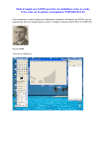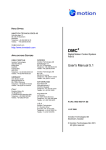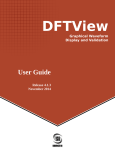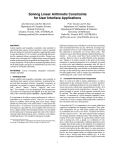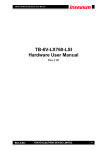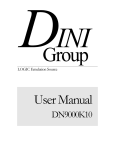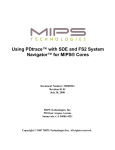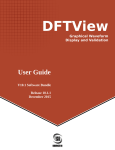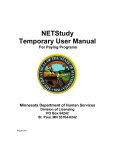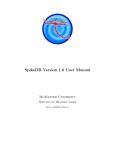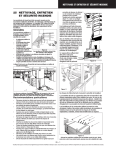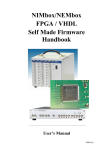Download plotline user manual
Transcript
plotline user manual Title Author Contact Website Release Date Version Rev. history v1.0.0 plotline (IP core) Nikolaos Kavvadias Courtesy of Ajax Compilers [email protected] http://www.ajaxcompilers.com 07 January 2013 1.0.0 07-01-2013 First public release. 1. Introduction The PLOTLINE graphics unit module is a synthesizable RTL VHDL model of Bresenham’s line drawing algorithm. The algorithm determines which points should be plotted in order to form a close approximation of a straight line segment between two given points (x0,y0) and (x1,y1). It is typically used for drawing lines on raster displays as well as fundamental functionality in numerous software graphics libraries. The algorithm uses only integer operations such as addition, subtraction, bit shifting, comparison, absolute value and conditional moves. It consists of a single loop that keeps track of the propagated error over the x- and y-axis, which is then used for calculating the subsequent pixel on the line. The loop terminates when the end point is reached. The following sections provide details on the contents of the distributed IP core, which include all necessary materials such as source files and scripts for RTL simulation and logic synthesis. Further, a demonstration system with VGA output is provided for FPGA testing of the PLOTLINE IP core. Reference documentation for PLOTLINE can be found in the /doc subdirectory in plain text, HTML and PDF form. 2. Functional description PLOTLINE is implemented as a fully synchronous FSMD (Finite-State Machine with Datapath). The interface diagram for streamed pixel generation is shown below. The core uses a single external clock source, connected to signal CLK. It can be asynchronously reset with the active high signal RESET. Signal START activates the core. Data inputs X0, Y0 and X1, Y1“ are the start and end point coordinates. Data outputs XOUT, YOUT are the x- and y-axis coordinates of the currently emitted pixel. DONE signifies the end of the current computation; when VALID is raised, a new pair of outputs (XOUT, YOUT) has been generated. READY indicates that the core can accept new input. 1 Figure 1: PLOTLINE FSMD I/O interface. 3. File listing The PLOTLINE distribution includes the following files. /plotline /bench/vhdl plotline tb.vhd std logic 1164 ta.vhd std logic textio.vhd /doc AUTHORS LICENSE plotline-fsmd-if.png plotline-pb.pdf README README.html README.pdf VERSION /rtl/vhdl plotline.vhd /sim/rtl sim sim/rtl sim/bin plotline.do plotline.mk /sim/rtl sim/out plotline.vcd plotline results.txt /sim/rtl sim/run plotline data.txt plotline-ghdl.sh plotline-mti.sh /sim/rtl sim/vhdl Top-level directory Benchmarks VHDL directory Self-checking testbench for the plotline IP. Useful additions to the std logic 1164 package. Draft version of the std logic textio package. Documentation directory List of authors. End-user license agreement for using the “plotline” distribution. PNG image illustrating the plotline I/O interface. Product brief (brochure) for the PLOTLINE IP core. This file. HTML version of README. PDF version of README. Current version of the PLOTLINE IP core. RTL source code directory for the IP core RTL VHDL design file. RTL simulation files directory RTL simulation scripts directory do script for Mentor Modelsim simulation. GNU Makefile for GHDL simulation. Dumps and other useful output from RTL simulation Value Change Dump file generated from RTL simulation. Diagnostic output from RTL simulation. Files for running RTL simulations Reference input/output data for RTL simulation. Bash shell script for running the GHDL simulation. Bash shell script for running the Modelsim simulation. VHDL sources for RTL simulation 2 clockdiv.vhd colordec.vhd data bram.vhd imgmap.vhd plotline system.vhd vga controller.vhd /sw plotline.bsl plotline.pbm plotline.ppm plotline test.c /syn/xise /sim/xise/bin xst.mk /sim/rtl sim/out plotline-256x256.bit /sim/rtl sim/run plotline sys-syn.sh plotline system.bit /sim/rtl sim/src plotline sys s3an.ucf Parametric clock divider. Color decoder to RGB444. Block-RAM based memory model. Plotline data generation and storage (data bram). Top-level VHDL source of the plotline demo system. Parametric VGA controller. Software utilities Optimized BASIL model for the plotline functionality. Generated PBM (binary) image from C model simulation. Generated PPM (color) image from C model simulation. Reference C model for the line drawing application. Synthesis files for use with Xilinx ISE Synthesis scripts directory Standard Makefile for command-line usage of ISE. Bitfiles and other useful output from synthesis Reference bitstream for the plotline system. Files for running synthesis Bash shell script for invoking the ISE tools. Newly generated bitstream as the result of synthesis. Additional source files for running synthesis User constraint file for the Xilinx Spartan-3AN starter kit development board. 4. Simulation The PLOTLINE IP core distribution supports both GHDL and Mentor Modelsim simulation. 4.1. GHDL For running the GHDL simulation, change directory to the /sim/rtl_sim/run subdirectory: $ cd $PLOTLINE_HOME/sim/rtl_sim/run assuming PLOTLINE_HOME is the directory where the top-level /plotline is found. Then, the corresponding shell script is executed: $ ./plotline-ghdl.sh The simulation produces two files, a VCD (waveform) dump named plotline.vcd and the diagnostic text file plotline_results.txt which are automatically copied to the /sim/rtl_sim/out subdirectory. 4.2. Modelsim Similarly, for running the Modelsim simulation, the corresponding shell script is executed from the /sim/rtl_sim/run subdirectory: $ ./plotline-mti.sh 3 As in the GHDL case, the VCD dump and the diagnostic text file are produced. 5. Synthesis The PLOTLINE IP core distribution supports both logic synthesis of a demo system that utilizes the PLOTLINE IP core for basic graphics generation. It should be noted that due to the specific block RAM storage size of the tested device (Xilinx XC3S700AN) the visible display is limited to 256x256. Different visible display dimensions are possible by configuring the X_OFFSET, Y_OFFSET, X_SIZE and Y_SIZE generics of the imgmap module. 5.1. Demo system The demo system comprises of the following components: • plotline system: The top-level component. • imgmap: Provides data content storage. Data is generated by plotline. • vga controller: VGA controller for graphic (bitmap) output. • clockdiv: Clock divider. • colordec: Color decoder for 16-color generation. • data bram: Synchronous read RAM model using separate address ports for writing and reading. Reading is solely used for graphics display. • plotline: The actual PLOTLINE IP core component. 5.2. Running the synthesis script For running the Xilinx ISE synthesis, change directory to the /syn/xise/run subdirectory: $ cd $PLOTLINE_HOME/syn/xise/run and execute the corresponding script: $ ./plotline_system-syn.sh The synthesis procedure invokes several Xilinx ISE command-line tools for logic synthesis as described in the corresponding Makefile, found in the the /syn/xise/bin subdirectory. Typically, this process includes the following: • Generation of the *.xst synthesis script file. • Generation of the *.ngc gate-level netlist file in NGC format. • Building the corresponding *.ngd file. • Performing mapping using map which generates the corresponding *.ncd file. • Place-and-routing using par which updates the corresponding *.ncd file. • Tracing critical paths using trce for reoptimizing the *.ncd file. • Bitstream generation (*.bit) using bitgen. 4 Finally, the plotline_system.bit bitstream file is produced and the impact GUI is invoked. From the impact GUI the following procedure is suggested (other options are also valid choices): • Select No in the Automatically Project File Load popup screen. • Select No in the Automatically create and save a project popup screen. • Select Cancel in the New Impact project. • From within the Impact Flows card (near top-left), double click on Boundary Scan. • From the File menu, select Initialize Chain. • Select Yes in the Auto Assign Configuration Files Query Dialog popup. • Select the generated bitfile from the Assign New Configuration File popup for loading to the XC3S700AN device. • Subsequently, select Bypass in order not to load the XCF04S PROM. • Select OK in the Device Programming Properties popup. • Right click to the XC3S700AN device symbol. • Select Program FPGA Only. Remember to connect a CRT/LCD VGA monitor to the development board’s DSUB-15 connector. 6. Reference software application The reference C application, available in the /sw subdirectory provides an implementation for Bresenham’s line generation algorithm. There are two basic usage schemes of plotline_test.c. When compiled as follows: $ gcc -DTEST -DSTREAM -Wall -O2 -o plotline_test.exe plotline_test.c executing plotline_test.exe, is used for generating the plotline_data.txt reference data file: ./plotline_test.exe >& plotline_data.txt This file should be copied to the sim/rtl_sim/run subdirectory. Alternatively, the reference application can be compiled for generating either a PBM (monochrome) or PPM (color) image file that emulates the VGA graphics display of the demo plotline system. Thus, when compiled as follows: $ gcc -DTEST -DSTORE -DDIAGNOSTICS -DSPARTAN3AN -DCOLOR -Wall -O2 -o plotline_test.exe plotline_test.c executing plotline_test.exe, produces the plotline.ppm file, while $ gcc -DTEST -DSTORE -DDIAGNOSTICS -DSPARTAN3AN -Wall -O2 -o plotline_test.exe plotline_test.c is used for generating the monochrome plotline.pbm file. 5 7. Prerequisities • Standard UNIX-based tools (tested with gcc-3.4.4 on cygwin/x86). – make – bash (shell) For this reason, Cygwin (http://sources.redhat.com/cygwin) is suggested, since it provides a nearcomplete POSIX environment. • GHDL simulator (http://ghdl.free.fr) or Modelsim (http://www.model.com). The latest GHDL distribution (0.29.1, Windows version) also installs GTKwave on Windows. • Xilinx ISE (free ISE webpack is available from the Xilinx website: http://www.xilinx.com) • XnView [optional] is an image file viewer that supports PBM, PGM and PPM files. It is available from here: http://www.xnview.com 6








